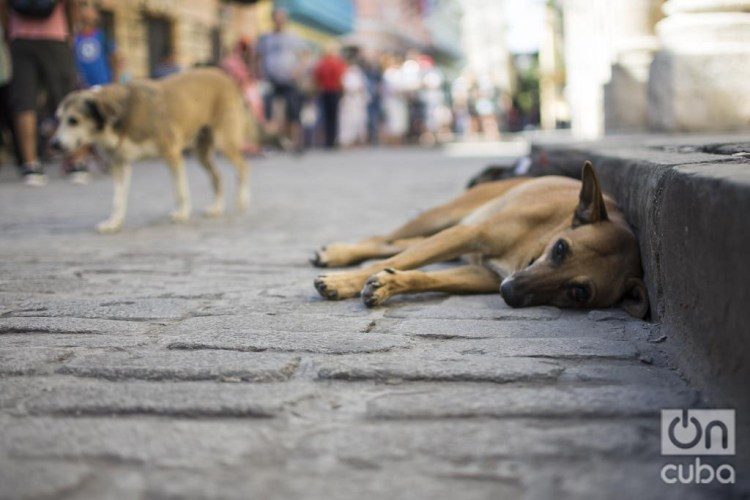The Cuban Ministry of Agriculture (MINAG) announced that “they are currently working on drawing up legal provisions to guarantee animal welfare,” according to a press release brought out this Friday on its official site.
The statement says that in recent weeks there has been a debate through the social media on issues concerning the protection and care of animals in Cuba, which has generated “concern” among Cubans.
Animal advocates called attention in recent days to a massive pick up of stray dogs in Havana―which they attributed to the visit of the king and queen of Spain and the 500th anniversary of the city―by the Zoonosis state program, in charge of this task and which many activists criticize for its methods of capturing and putting to sleep the animals.
“The way they catch dogs that roam the streets on the grounds that they transmit diseases is a form of mistreatment. Why not sterilize them? Why do they have to kill them?” asked an activist.
The information released on Friday by MINAG recalls that during the consultation process for the creation of the new Cuban Constitution the issue of animal abuse and animal rights generated “multiple opinions,” and that, in the end, the Magna Carta reflected in subsection j of its article 90 the duty of every Cuban citizen to protect wildlife and ensure the conservation of a healthy environment.
Se trabaja actualmente en la elaboración de disposiciones jurídicas dirigidas a garantizar el bienestar animal. Ver texto completo en el @MINAGCuba https://t.co/OtFftbTv5T #SomosCuba #SomosContinuidad @PresidenciaCuba @LuisMonteroMus1
— Ministerio de la Agricultura de Cuba (@MinagCuba) November 15, 2019
The Ministry of Agriculture assures that, in accordance with that constitutional mandate, the country is working on the drawing up of legal provisions aimed at guaranteeing the welfare of animals, and that these regulations will use as reference the Terrestrial Animal Health Code, approved by the World Organization for Animal Health.
However, the statement warns that in Cuba 20,000 people suffer injuries caused by animals every year, and of them 80% are caused by dogs, and notes that, according to the World Health Organization, currently 75% of the emerging pathogenic agents that affect humans are of animal origin.
The press release also praises the Cuban program of surveillance, prevention and control of these diseases, which, it says, has allowed maintaining low morbidity rates associated with rabies, leptospirosis, toxoplasmosis, among others.
Finally, it affirms that the health of the environment will remain a state priority, and it includes the welfare of animals.
The approval of an animal protection or animal welfare law has been a constant claim of the defenders of the rights of animals in Cuba, who have gained strength, organization and visibility on the island in recent times.
Following the allegations of recent days, a group of activists held an unusual protest in front of the headquarters of an animal observation center of the Zoonosis program in Havana and got the authorities to give them a dozen dogs that were about to be put to sleep.
The next day they met with authorities of the Ministry of Public Health to address the issue that, according to the official portal Razones de Cuba “was, in short, a first step to strengthen an alliance between the state sector and civil society to finally contribute to the aim that both share as ideal: animal welfare.”
However, this very portal mentioned the complaints of animal protectors about a massive pick up of dogs in Havana, which it attributed to the “misleading information” or “ignorance” of the activists; although it acknowledged that the staff and methods of the Zoonosis program were not adequate.
In April, the activists managed to get authorization for a march through the streets of Havana demanding an Animal Protection Law. It had a wide convocation, but thereafter the authorities had not allowed more walks or protests in other places.
On that occasion―on the date of the celebration of Dog’s Day―hundreds of activists walked about three kilometers with banners and raised their voices to say “Law yes, abuse no” and “Stop animal abuse. They also feel.”
In addition to the most visible situation, that of stray dogs, animal advocates have also drawn attention to the need to protect horses used in transportation and agriculture, animals involved in cockfights and dogfights, illegal on the island, and even exotic animals caged in zoos.
The movements that work to raise awareness about the rights of all animals―among which are Aniplan, CEDA and PAC―organize free adoptions, vaccination and castration campaigns, and also report incidents of abuse.










